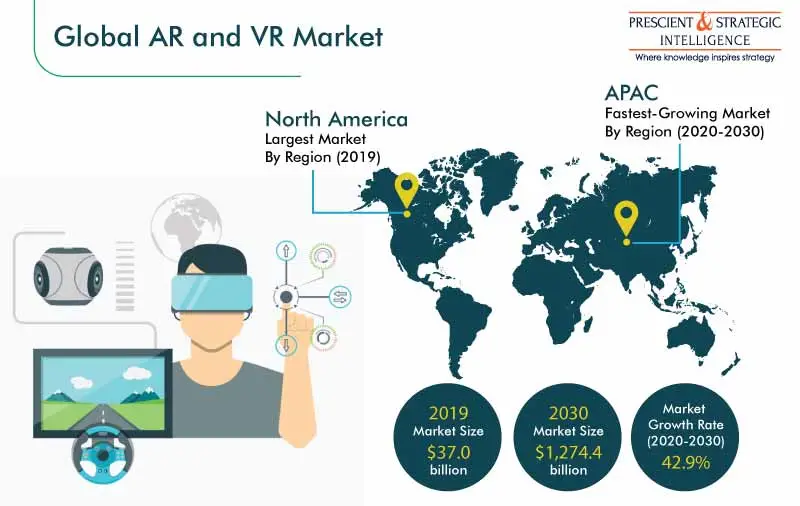As more businesses move to embrace digital transformation in preparation for a post-pandemic world, the fledgling technologies of both augmented reality and virtual reality are increasingly being identified as a key marketing tool.
Essentially, AR and VR have the potential to transform environments into immersive virtual worlds in which users can interact with objects and other individuals remotely who are using the same technology. This perception-altering digital experience is quickly being identified within the hospitality industry as a revolutionary development that could enrich the lives of consumers in a cost-effective manner.

(Image: PS Intelligence)
As the data above shows, the global AR and VR market is set to grow exponentially over the course of the decade, attaining a total market value of $1.27 trillion by 2030. While this particular market will be shared across a range of industries, it’s likely that hospitality will see significant benefits from the emerging technologies. Let’s take a deeper look into how both augmented reality and virtual reality will transform hospitality in the future:
Augmented Reality and The Interactive Hotel
One key way in which the hospitality industry can embrace augmented reality is through the implementation of interactive elements within locations. We’ve already seen a use case of this emerging in the form of The Hub Hotel from Premier Inn in the UK, which began by using AR alongside wall maps placed within its hotel rooms.

(Image: Business Traveller)
By interacting with the map through the use of smartphones, guests can see more immersive information surrounding local places of interest – helping to bring a brand new level of engagement to a simple wall map and prospectively paving the way for a more enjoyable stay.
AR can significantly enhance the guest experience when it comes to hotels and hospitality alike. Augmented reality has the ability to allow guests to scan areas of the hotel to find out more about its history, surroundings and heritage. For instance, a guest can hold up a smartphone camera to a painting and their dedicated hotel AR application will be capable of revealing more information about its significance via a 3D overlay.
In the wider world of hospitality, AR applications could also be adapted to accommodate virtual menus featuring 3D interactive renderings of things like cocktails or other foods or services. For the early adopters leveraging this technology, it can generate a significant social media buzz surrounding brands. According to Ian Millar, Professor at Ecole hôtelière de Lausanne, the only thing standing in the way of these applications becoming a reality in the near future is the level of investment needed. “Will AR be a budget priority over the next few years? That we will have to wait and see.”
Could Virtual Reality Replace Real World Experiences in Hospitality?
Innovation in the virtual reality space is pacing the way for new affordable and high-performance hardware that renders fully immersive experiences for users. The potential of VR in terms of travel and tourism are far-reaching, with virtual experiences possessing the potential to one day replace many real-world experiences.
For the hotel and hospitality industry, both VR and AR alike have long been identified as an opportunity to win more custom and generate more revenue, and many hotels are looking to adapt reality technology as a means of finding a competitive edge.
Virtual reality has the potential to change much more than just the experiences that guests can have on their travels, it can also revolutionise online hotel tours, booking processes, training for hospitality staff and the entertainment available for guests.
Although virtual reality is unlikely to replace real-world tourist experiences, the additional sensory features that VR can provide is likely to help enhance the experience of individuals and also generate more appeal ahead of deciding on a place to visit. For example, research has shown that experiencing a destination in virtual reality typically makes users more likely to make a visit in real life. Immersive VR tours may ultimately be reason enough for a traveller to make the decision to book a certain real-world experience.
The potential for both AR and VR in the world of hospitality is far-reaching, especially at a time when COVID-19 has severely impacted the industry around the world. In incorporating reality technology into their processes, hospitality companies may find themselves better placed to innovate their way through the challenges posed by the pandemic.







